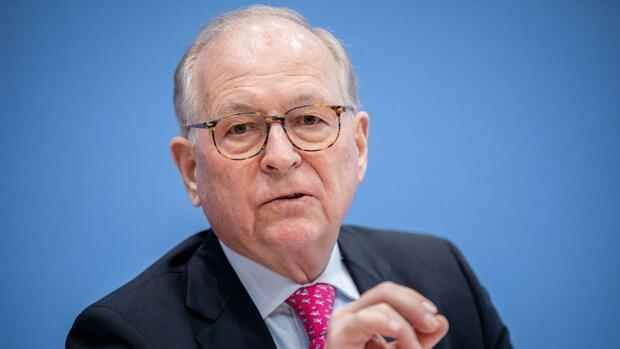The former State Secretary in the Federal Foreign Office warns of the numerous geopolitical crises.
(Photo: dpa)
Berlin Shortly before the start of the Munich Security Conference (MSC) on Friday, Wolfgang Ischinger looks with concern at the current world situation. “Since I took over the chair of the security conference in 2008, there have never been as many critical developments as there are today,” said the 75-year-old ex-diplomat, who will soon hand over the management of the MSC to former Merkel adviser Christoph Heusgen.
The new Munich Security Report 2022, which Ischinger presented in Berlin, meticulously lists most of the current threats: from the possible war in Ukraine and the failure of the West in Afghanistan and Mali to the pandemic that has not yet been overcome, climate change and the growing geopolitical tensions with China.
“The trend towards the retreat of democracy continues. It is therefore not surprising that a feeling of helplessness seems to be growing in Europe and beyond,” said Ischinger.
The MSC report and security conference come at a critical time in international relations. Chancellor Olaf Scholz (SPD) is traveling to Kiev today and then on to Moscow to prevent Russian troops from invading Ukraine. According to information from government circles in Washington, US secret services expect that a Russian attack could be imminent.
Top jobs of the day
Find the best jobs now and
be notified by email.
At the three-day security conference in Munich next weekend, Scholz will also have to put up with criticism from allies who find Germany’s approach to the Ukraine crisis too hesitant and vague. The main point of criticism is the Nord Stream 2 Baltic Sea pipeline, the commissioning of which the Chancellor has not yet officially ruled out in the event of a Russian attack on Ukraine.
In their new report, the MSC researchers come to the worrying conclusion that citizens in many countries are facing increasing risks, but at the same time have the feeling that their country can no longer control world events.
In Germany, half of the citizens share this assessment. 12,000 people from the seven leading industrial nations (G7) as well as Brazil, Russia, India, China and South Africa (Brics countries) were surveyed.
Just as many people suffer from “learned helplessness,” so too can societies come to believe that they can no longer handle the challenges they face, the report says. “The liberal democracies seem to feel particularly overwhelmed.” This perception is extremely dangerous because it could become a self-fulfilling prophecy.
Especially in Europe, the feeling of helplessness is spreading, said MSC boss Ischinger. “Despite its significant economic power, Europe often seems to have lost faith in its ability to influence world affairs,” he said.
At the same time, he criticized the fact that international organizations such as the United Nations, the World Health Organization and the World Trade Organization WTO were becoming less and less important. “International organizations are no longer seen as indispensable when it comes to bringing about positive change or adding value. This is a big mistake,” said Ischinger. In this respect, the helplessness is self-inflicted.
>> Read here: NATO enlargement – the tale of the breach of contract with Moscow
Of particular concern: while more than half of those surveyed feel helpless in democratically governed countries, according to the report, the figure is just over 40 percent in authoritarian states. Democracies are also coming under increasing pressure as a result, as confirmed by the new “Democracy Index” from the think tank Economist Intelligence Unit.
Accordingly, less than half of the world’s population live in democratic countries. More than a third, on the other hand, is governed in an authoritarian manner.
More: Follow the current developments in the Ukraine conflict in our news blog

